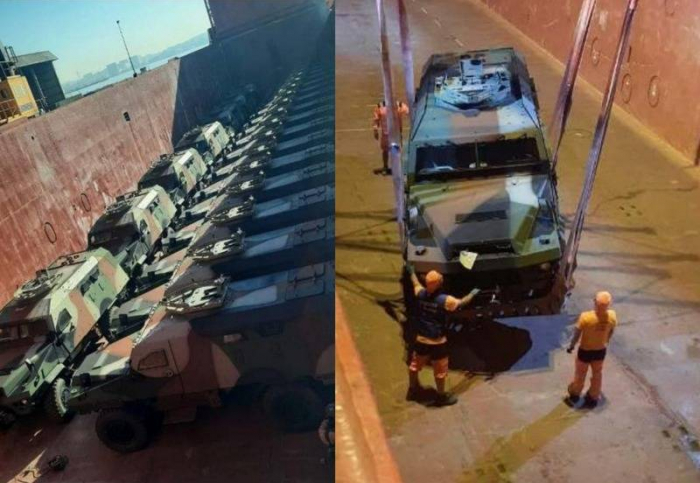On November 12, it was reported that France sent a batch of Bastion armoured vehicles to Armenia as part of the newly established military cooperation program with the South Caucasian country. The batch, visually comprising 22 armoured vehicles, reached the port of Poti in Georgia and subsequently proceeded to Armenia via rail transport. In addition to armoured vehicles, France has earlier announced selling air defence systems to Armenia - writes Vasif Huseynov
In October, a month after the collapse of the Armenian separatist entity in the Karabakh region of Azerbaijan, Armenia signed a contract to acquire three Ground Master 200 radars produced by Thales, the same type deployed in Ukraine to counter Russian aggression. Additionally, Armenia finalized a separate contract with Safran for equipment such as binoculars and sensors. A letter of intent was also signed between Armenia and France, initiating the process for the procurement of Mistral air defence systems manufactured by MBDA. In parallel, Armenia acquires different types of military equipment, including multiple rocket launchers from India.
This militarization of Armenia coincides with the advent of unprecedented peace opportunities between Yerevan and Baku. On September 19-20, Azerbaijan carried out carefully designed anti-terror operations against the illegal armed units of the Armenian separatist regime in Karabakh. The operations which lasted only one day and with minimal civilian losses resulted in the self-dissolution of the illegal entity, which declared itself as “Nagorno-Karabakh Republic”. Despite the fact that the governments of both Azerbaijan and Armenia, including Prime Minister Nikol Pashinyan, declared that there was no threat to the civilian population following the end of the operations, the local Armenians voluntarily decided to flee the Karabakh region to Armenia. Azerbaijan has launched an online portal and various other initiatives to provide proper conditions for the safe and dignified return of Armenians to Karabakh, while the United Nations dispelled the claims concerning forced displacement and ethnic cleansing.
Against the backdrop of these developments, Armenia and Azerbaijan started speaking positively of the chance to sign a peace treaty by the end of 2023. In his address on September 20, Aliyev commended Armenia’s reaction to the clashes in Karabakh and found it constructive for the future of the peace process. Likewise, the speaker of the Armenian Parliament Alen Simonyan did not rule out the possibility of signing a peace treaty at the European Union–mediated summit that was planned to be held on the sidelines of the gathering of the European Political Community (EPC) in Granada, Spain, on October 5.
The Granada summit was indeed a long-awaited occasion for the Armenia-Azerbaijan peace process, and it was largely hoped that they would mark an important breakthrough, if not sign a peace treaty within the framework of that summit. It’s worth recalling that the two countries recognized each other’s territorial integrity exactly a year ago on the sidelines of the first summit of the EPC on October 6, 2022. Hence, the Granada summit had also symbolic importance for the Armenia-Azerbaijan peace talks.
Yet this summit did not take place. The reason for this failure was more related to another country, namely France, that was supposed to serve as a neutral mediator at the Granada summit and bring Baku and Yerevan closer to peace. Instead of pursuing shuttle diplomacy and supporting the two South Caucasian countries to grab the peace opportunity, on October 3, two days before the Granada summit, French Foreign Minister Catherine Colonna paid a visit to Yerevan and stated the agreement of her government to deliver military supplies to Armenia.
Hence, Baku insisted on inviting Türkiye to attend the Granada summit along with France, Germany, and the European Council. This proposal was rejected by Paris and Berlin which led to Baku’s cancellation of the participation of President Ilham Aliyev at the meeting. “France’s biased actions and militarization policy… seriously undermine regional peace and stability in the South Caucasus and put at risk European Union’s overall policy towards the region”, tweeted foreign policy advisor to the Azerbaijani President, Hikmet Hajiyev. Following this setback in the peace process, it was unsurprising to witness the failure of another European effort to bring together the leaders of Armenia and Azerbaijan in Brussels, using the traditional format with European Council President Charles Michel in late October.
That said, France’s militarization of Armenia and its biased policies towards the South Caucasus have cast a shadow over the fragile peace emerging in the region. As both Armenia and Azerbaijan appeared to be on the verge of a historic peace agreement following the swift resolution of conflict in the Karabakh region, France’s decision to supply military equipment to Armenia has introduced a disruptive element. It seems that France is gearing up Armenia for potential conflict with Azerbaijan rather than fostering peace with its eastern neighbour.
Thus, the failure of the Granada summit, initially anticipated as a significant step toward a peace treaty, is emblematic of the challenges posed by such external influences. The biased actions of France not only jeopardize regional stability but also strain the European Union's broader policy in the South Caucasus. As the delicate peace process encounters setbacks, the need for impartial mediation and diplomatic efforts becomes increasingly paramount.
AzVision.az
More about: Azerbaijan Caucasus France Armenia
















































